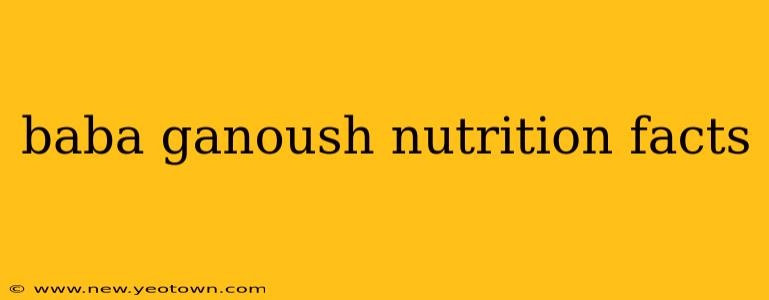Baba ghanoush, that smoky, creamy eggplant dip, is a staple in Middle Eastern and Mediterranean cuisine. But beyond its delicious taste, what are the nutritional benefits? Let's dive into the nutritional facts of this flavorful spread and uncover its hidden health advantages. This isn't just another recipe; it's a journey into the heart of a healthy and satisfying food.
What are the main ingredients in baba ghanoush?
The foundation of any good baba ghanoush is, of course, the eggplant. Imagine a perfectly roasted eggplant, its flesh soft and yielding, its skin charred to perfection. That's the star of our show. Beyond the eggplant, tahini (sesame seed paste) lends its rich, nutty flavor and creamy texture. Lemon juice adds brightness and acidity, balancing the richness of the tahini. Garlic, a pungent and aromatic addition, lends a powerful savory note. Finally, a drizzle of olive oil – the liquid gold of the Mediterranean – brings everything together, adding healthy fats and a subtle peppery finish. Sometimes, a sprinkle of paprika or cumin adds a touch of warmth and spice.
What are the nutritional benefits of baba ghanoush?
Baba ghanoush isn't just delicious; it's packed with nutritional goodness. The eggplant itself is a powerhouse of vitamins and minerals. It's a good source of fiber, promoting healthy digestion and helping you feel full and satisfied. It also contains potassium, an essential mineral for maintaining healthy blood pressure. The tahini contributes healthy fats, mostly unsaturated fats, which are beneficial for heart health. These fats also help your body absorb fat-soluble vitamins. The lemon juice is a good source of Vitamin C, a powerful antioxidant. And let's not forget the olive oil, brimming with monounsaturated fats, antioxidants, and anti-inflammatory compounds.
How many calories are in baba ghanoush?
The calorie count in baba ghanoush can vary depending on the recipe and serving size. A typical serving (about ¼ cup) might contain anywhere from 80 to 150 calories. This relatively low calorie count, combined with its fiber content, makes it a satisfying and relatively low-calorie snack or appetizer.
Is baba ghanoush good for weight loss?
Because of its fiber and healthy fats, baba ghanoush can be part of a healthy weight-loss diet. The fiber helps you feel full, preventing overeating. However, remember portion control is key. While it's a healthier choice than many dips, overindulging in any food can hinder weight loss efforts.
Is baba ghanoush healthy?
Absolutely! Baba ghanoush is a healthy and nutritious dip, especially when made with fresh, high-quality ingredients. It offers a good balance of healthy fats, fiber, and vitamins and minerals.
What are the potential downsides of eating baba ghanoush?
While generally healthy, there are a few potential downsides to consider. Individuals with sesame allergies should avoid baba ghanoush due to the tahini. The sodium content can be relatively high depending on the recipe, so those watching their sodium intake should be mindful. Also, it's important to remember that moderation is key; even healthy foods should be consumed in appropriate amounts as part of a balanced diet.
Can I make baba ghanoush at home?
Yes! Making baba ghanoush at home is easy and rewarding. You have complete control over the ingredients, ensuring freshness and quality. Numerous recipes are readily available online, offering variations to suit your taste preferences.
In conclusion, baba ghanoush is a delicious and nutritious dip that can be a valuable addition to a healthy diet. Its rich flavor, creamy texture, and impressive nutritional profile make it a satisfying and wholesome choice. So, the next time you're looking for a healthy and flavorful appetizer or snack, reach for the baba ghanoush. Your taste buds and your body will thank you.

